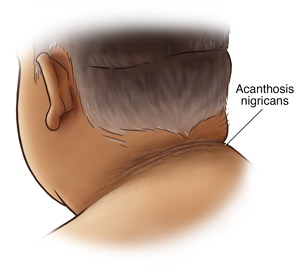Understanding Acanthosis Nigricans
Acanthosis nigricans is a skin condition. It causes dark, thick patches on the skin. These patches often occur in the folds or creases of the skin, such as on the neck. It is more common in people who are overweight or obese or who have a family history of the condition. It is also more common in people who are of American Indian, Black American, or Hispanic descent.

How to say it
ak-an-THOH-sihs NI-grih-koonz
What causes acanthosis nigricans?
It isn’t always clear exactly what causes this skin problem. It may partly be genetic or linked to insulin resistance and diabetes. Many cases occur in people who have type 2 diabetes or who are obese and at high risk of developing type 2 diabetes.
In rare cases, it has been linked to some cancers, such as melanoma, liver, colon, and stomach. Some medicines may also cause it. These include birth control pills, niacin, and strong corticosteroids such as prednisone. This condition may also be related to hormone disorders.
Symptoms of acanthosis nigricans
This skin condition can flare up anywhere on the body but most often is found on the neck, armpits, groin, elbows, and back of the knees. The skin may look dirty and dry at first. It then thickens and darkens. The patches are velvety in texture. They may range in color from brown to black. Thick areas may become moist and have an odor.
Treatment for acanthosis nigricans
This skin condition can be treated. Treatment options include:
-
Managing the underlying health problem. Some cases of this skin condition will go away if you take care of the health problem that may be causing it. For example, if you are obese, your skin may improve if you lose some weight. People with diabetes may have clearer skin if they keep their blood sugar under control.
-
Using medicines for the skin (topical). Certain creams, lotions, or gels may help lighten up or dry out the skin.
In some cases, you may have laser therapy to thin or lighten the skin.
When to call your healthcare provider
Call your healthcare provider right away if you have any of these:
-
Fever of 100.4°F (38°C) or higher, or as directed
-
Pain that gets worse
-
Symptoms that don’t get better, or get worse
-
New symptoms